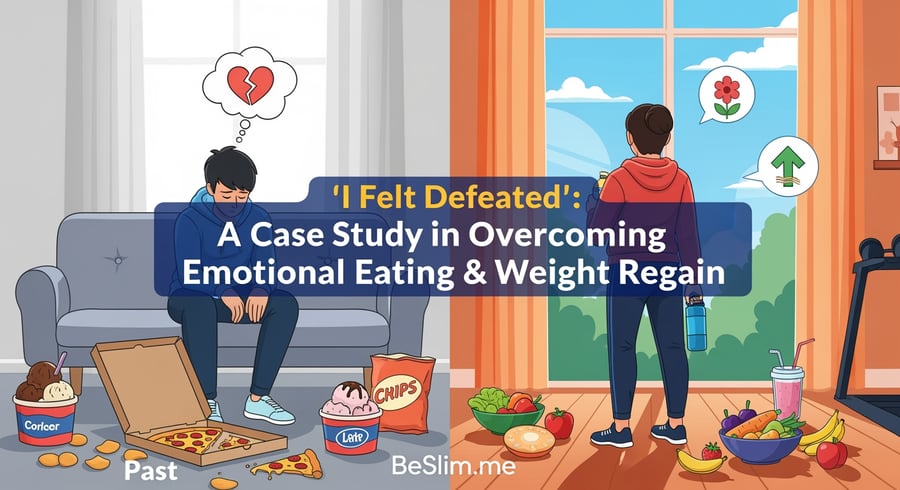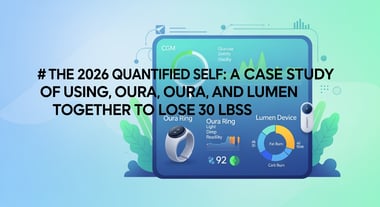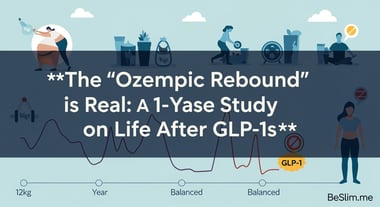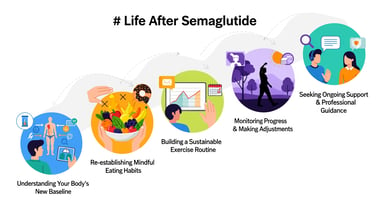Hello, I'm Master Kim, the Empathic Storyteller and Editor for BeSlim.me. Today, I want to share a deeply personal case study that's close to my heart. It's the story of Sarah, a woman who battled emotional eating and the frustrating cycle of weight regain. I'll narrate her journey in her own words, drawing from our conversations, to make it feel as real and raw as possible. As I comment along the way, remember: I've been there in my own struggles, and I know how defeating it can feel. But stories like Sarah's remind us that transformation is possible with empathy, effort, and understanding. Let's dive in.
The Struggle
I remember the day it all hit me like a ton of bricks. There I was, sitting on my couch after a long, stressful day at work, surrounded by empty snack wrappers and a half-eaten pint of ice cream. "Why do I keep doing this to myself?" I whispered, tears streaming down my face. My name is Sarah, and for years, emotional eating was my constant companion—and my worst enemy. It wasn't just about the food; it was about the emotions that drove me to it. Stress from my job as a marketing executive, loneliness after my divorce, and the nagging anxiety of everyday life turned food into my go-to comfort.
It started innocently enough. In my early 30s, I decided to lose weight after hitting 220 pounds on my 5'6" frame. I joined a popular diet program, cut calories drastically, and exercised like my life depended on it. The pounds melted away— I dropped 50 pounds in six months. I felt invincible, posting before-and-after photos on social media and basking in the compliments. But deep down, I hadn't addressed the real issue: why I ate the way I did. Emotional eating wasn't just a habit; it was my coping mechanism for dealing with life's curveballs.
Then came the regain. It crept up slowly at first—a stressful project at work led to late-night binges on chips and chocolate. A fight with a friend meant ordering pizza and eating the whole thing alone. Before I knew it, 20 pounds were back, then 30. Each time I "failed," the defeat felt heavier. I'd stare at myself in the mirror, thinking, "I'm such a loser. Why can't I just control myself?" The shame spiraled into more eating, creating a vicious cycle. I tried everything: fad diets, detox teas, even therapy apps that promised quick fixes. But nothing stuck because I was treating the symptoms, not the root cause.
Master Kim here: Sarah's story resonates with so many I've heard. That feeling of defeat isn't just about the scale—it's the emotional toll of repeated setbacks. She described nights where cortisol-fueled stress kept her awake, only to raid the fridge at 2 a.m. It's heartbreaking, but it's also human. If you're reading this and nodding along, know that you're not alone in this struggle.
My attempts to break free were fraught with frustration. One time, I went on a strict keto diet, eliminating carbs entirely. It worked for a while, but the deprivation made my cravings worse. I'd white-knuckle through the day, only to cave in the evening when emotions ran high. Another failed attempt was joining a gym with a personal trainer. The workouts were grueling, and while I built some muscle, the emotional eating persisted. I'd reward myself with "cheat days" that turned into cheat weeks. By my mid-30s, I'd regained all 50 pounds plus an extra 10, tipping the scale at 280 pounds. My energy was nonexistent; simple tasks like climbing stairs left me winded. Worse, my self-esteem was in tatters. I avoided social events, convinced everyone was judging me. "I'm defeated," I'd tell myself. "This is just who I am."
The emotional weight was heavier than the physical. Anxiety and depression intertwined with my eating habits, making every day a battle. I felt trapped in a body that didn't feel like mine, and the constant yo-yoing eroded my trust in myself. It wasn't until a particularly low point—a family gathering where I hid in the bathroom to cry after overeating—that I realized something had to change. But how? I'd tried so hard, failed so often. Little did I know, the turning point was just around the corner.
The Turning Point
Rock bottom came during a routine doctor's visit. My physician, seeing my bloodwork, gently but firmly said, "Sarah, your habits are putting you at risk for more than just weight gain—think diabetes, heart issues." That scared me, but it also sparked something. I started researching, desperate for a sustainable way out. That's when I stumbled upon the concept of emotional eating as a response to stress hormones like cortisol. It wasn't just willpower; it was biology.
Master Kim interrupting for a moment: Sarah's discovery here is key. She began understanding how chronic stress elevates cortisol, which can disrupt hunger signals and lead to overeating. According to research from the Mayo Clinic, high cortisol levels from stress can increase appetite and cravings for high-fat, sugary foods, making emotional eating a physiological response, not just a character flaw. This insight was her first step toward empathy for herself.
I dove deeper, learning about leptin resistance—a condition where the body's "fullness" hormone doesn't signal properly, often exacerbated by yo-yo dieting and stress. It explained why I felt constantly hungry, even after eating. Studies from the National Institutes of Health confirmed this: leptin resistance can contribute to weight regain by impairing the brain's ability to regulate energy balance. Armed with this knowledge, I sought a holistic approach, not another quick fix.
The real turning point was enrolling in a mindfulness-based eating program recommended by a friend. It combined therapy with nutritional guidance, focusing on habit formation through small, consistent changes. Instead of banning foods, it taught me to pause and identify emotional triggers. I started journaling: What was I feeling before I reached for the snacks? Was it boredom, anger, or sadness? This built awareness, drawing from principles of habit formation outlined in behavioral science. For instance, research from the Cleveland Clinic highlights how building mindful habits can rewire neural pathways to reduce impulsive eating. It wasn't overnight magic; it required effort, like setting phone reminders to breathe deeply during stress.
I also incorporated cortisol management techniques: daily walks in nature, yoga sessions, and better sleep hygiene. No more all-or-nothing diets—instead, balanced meals with room for treats mindfully enjoyed. Therapy helped unpack the divorce's emotional baggage, revealing how food had become my emotional crutch. Slowly, I rebuilt trust in my body, learning to listen to true hunger cues rather than emotional ones. It was hard work, with slip-ups along the way, but each one became a lesson, not a defeat.
The Success
Fast forward two years, and my life is transformed—not just on the scale, but in my heart and mind. I've lost 70 pounds steadily, bringing me to 210 pounds, but more importantly, I've maintained it without the regain cycle. My energy is back; I hike with friends on weekends, something I couldn't imagine before. Work stress? I handle it with a quick meditation break instead of a candy bar. Social events are enjoyable now, free from the shame that once isolated me.
Master Kim again: Seeing Sarah's victories warms my soul. Her story isn't about a miracle; it's about consistent, empathetic effort. She transformed her relationship with food, turning emotional eating from a foe into a signal to check in with herself.
The psychological wins are profound. I no longer feel defeated—I've built resilience. Therapy revealed patterns from my childhood, where food was comfort during family tensions. Now, I use tools like mindful eating to savor meals, appreciating flavors without guilt. My bloodwork improved dramatically; no more prediabetes warnings. Physically, clothes fit better, and I move with ease. But the real success is emotional freedom: confidence in my ability to navigate life's ups and downs without self-sabotage.
Of course, it's not perfect. There are still tough days—a argument with my sister might tempt old habits—but I've learned to forgive myself and get back on track. This journey taught me that weight management is 80% mental, 20% physical. By addressing leptin resistance through steady nutrition and cortisol via stress reduction, I've created a sustainable lifestyle. Habit formation, like prepping healthy snacks ahead of time, keeps me consistent.
Inspiring others has become part of my success. I share my story in support groups, helping people see they're not alone. Life feels lighter, fuller. I'm not just slimmer; I'm happier, more present. If I can overcome this, so can you—with patience and self-compassion.
Key Lessons for Your Journey
Identify Your Triggers Mindfully: Start a journal to track emotions before eating. This builds awareness and breaks the automatic cycle of emotional eating—remember, it's about understanding, not judgment.
Manage Stress to Tame Cortisol: Incorporate daily practices like walking or yoga to lower stress hormones. Consistency here prevents cravings from derailing your progress.
Build Habits Gradually, Not Drastically: Focus on small changes, like mindful portioning, to foster long-term success. Avoid all-or-nothing approaches; sustainability comes from effort and self-forgiveness.
As Master Kim, I hope Sarah's story touches you as it did me. Emotional eating and weight regain are tough battles, but with empathy and science-backed strategies, victory is within reach. Keep going—you've got this.
References
- High cortisol levels from stress can increase appetite and cravings for high-fat, sugary foods - mayoclinic.org
- Leptin resistance can contribute to weight regain by impairing the brain's ability to regulate energy balance - ncbi.nlm.nih.gov
- Building mindful habits can rewire neural pathways to reduce impulsive eating - health.clevelandclinic.org
Medical Disclaimer
The content on this website is for informational and educational purposes only. It is not intended as medical advice and should not be relied upon as a substitute for consultations with qualified healthcare professionals who are familiar with your individual medical needs. Always seek the advice of your physician or other qualified healthcare provider with any questions you may have regarding a medical condition. Never disregard professional medical advice or delay in seeking it because of something you have read on this website.




